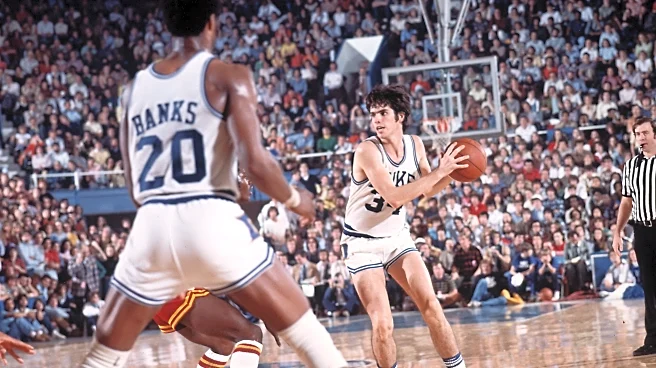Prominently employing and appreciating freshmen is a relatively new phenomenon in the ACC
By NCAA edict freshmen couldn’t participate in varsity sports during the first 20 years the ACC was in existence.
Prior to the 1972-73 season freshmen played on separate, junior varsity basketball squads such as the Blue Imps for Duke and UNC’s Tar Babies. Long after other schools stopped sponsoring them, Carolina still had a JV – no longer offensively named — playing prep schools and the like under the guidance of a varsity assistant coach. Hubert Davis, now the Tar Heel head coach, earned valuable coaching experience directing the JV under Roy Williams, who’d likewise coached the JV under Dean Smith.
Clemson guard Skip Wise was the first freshman voted to the All-ACC first team, in 1975. One other freshman was similarly honored during the seventies, as Virginia’s Jeff Lamp made second-team in 1978.
Freshmen weren’t much more popular with media voters during the eighties. Helped by a short, experimental 3-pointer, Mark Price of Georgia Tech made second team in 1983 as the first freshman to lead the ACC in scoring (20.3-point average). Not until 2018 did another freshman, Duke’s Marvin Bagley III, pace the league (21.0). The only other freshman earning all-league recognition in the eighties was UNC’s J.R. Reid, voted to the second team in 1987.
Recognition inched upward for freshmen in the nineties, as three were All-ACC selections. Tech’s dazzling Kenny Anderson made first-team in 1990, the second freshman so honored as he led the Yellow Jackets to their first Final Four. Wake’s Rodney Rogers, an elegant bull on the court, made second-team in 1991, and Tech guard Stephon Marbury made first-time as he led the 1996 Jackets to a bounce-back, first-place ACC finish.
Only three freshmen made all-conference in the first decade of this century – UNC’s Joseph Forte in 2000 and Tech’s Chris Bosh in 2003 made second team, and Carolina’s relentless Tyler Hansborough was a unanimous first-teamer in 2006 alongside Duke seniors J.J. Redick and Shelden Williams.
The floodgates opened wide for freshman recognition over the past 15 years, especially at Duke, with a closed universe of voters picking at least one freshman for All-ACC honors every season — other than 2013 — from 2011 through 2025.
Of the dozen freshmen deemed worthy of all-league recognition on the first or second team from 2010 through 2019, eight played for Duke, as did five of seven selected since 2020.
In all that time, encompassing all those players, only four freshmen, all Blue Devils, were voted both the ACC’s Rookie of the Year and Player of the Year in the same season, all since 2015. Cooper Flagg, readers surely recall, earned double honors last season.
The preseason voting in 2025-26 favors another Dukie, Cameron Boozer, to become Duke’s 15th Rookie of the Year in the 51st season the honor is bestowed. Boozer would be the 11th Blue Devil to win the award in the past 15 years as prominent prep prospects increasingly settle for a year or two at Cameron Indoor Stadium. This helps explain Duke’s current standing as the ACC’s premier program, and in turn attracts the attention of top prep prospects.
Overall, better than one in four ACC Rookies of the Year (28 percent) played at Duke since Jim Spanarkel, now a TV announcer, won the first award in 1976. Three of the first four ACC Rookies of the Year (NC State’s Hawkeye Whitney tied Gminski in ’77) became the core of the Devils’ 1978 Final Four team under coach Bill Foster.
| HITS RIGHT OFF THE BAT Duke ACC Rookies of the Year (* Player of Year, same season) |
|
| Jim Spanarkel | 1976 |
| Mike Gminski | 1977 |
| Gene Banks | 1978 |
| Chris Duhon | 2001 |
| Kyle Singler | 2008 |
| Austin Rivers | 2012 |
| Jabari Parker | 2014 |
| Jahlil Okafor* | 2015 |
| Brandon Ingram | 2016 |
| Marvin Bagley III* | 2018 |
| Zion Williamson* | 2019 |
| Vernon Carey, Jr. | 2020 |
| Paolo Banchero | 2022 |
| Kyle Filipowski | 2023 |
| Cooper Flagg* | 2025 |










